
views
Identifying a Food Obsession
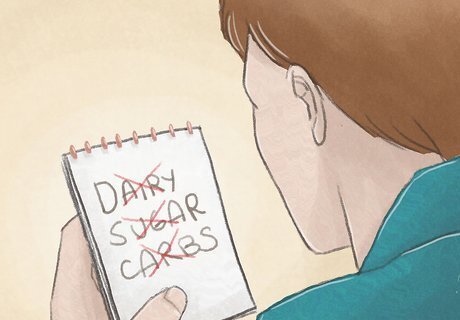
Recall the rules of the last diet you tried. Obsessive food thoughts can be a lingering effect from dieting. If you've been on a lot of diets, or a very restrictive diet, you may still be holding onto ideas about what foods are "good" or "bad." Thinking about the rules you learned for your last diet can point to where some of your thoughts are coming from. When you diet, you may stop trusting how your body feels and instead rely on rules. To stop obsessing over food, you will have to learn to trust your body again. Diets can include cutting out entire food groups, such as dairy, carbs, or sugar. They can also be strict meal plans.
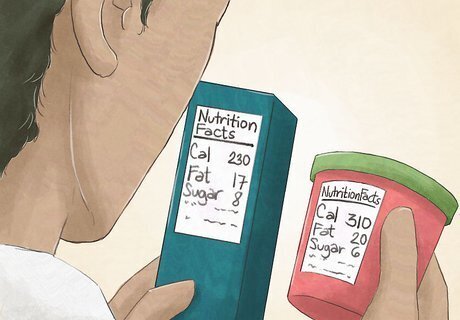
Notice the food-related questions you ask yourself a lot. When you have a food obsession, you might find yourself asking the same question or questions related to food over and over again. This could be while you are eating, when you are shopping for food, or when you are hungry. Common questions that could mean you have a food obsession include, "Am I allowed to eat this?", "How many points is this?", and "Does this have too many carbs/too much sugar/too much fat?"
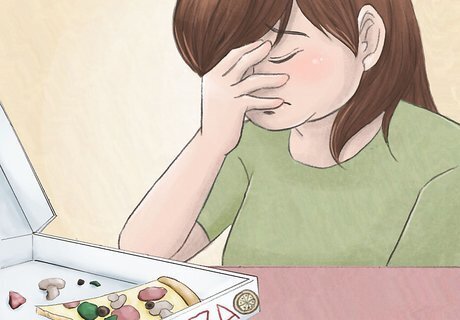
Recognize how you feel while you are eating. Food obsessions most often come about because we want to control our environment. They can be a sign of underlying anxiety, depression, or OCD. Treating these conditions can help you stop obsessing over food. Some common feelings that could be a sign of a food obsession include guilt after binging, stress around "healthy" or "safe" foods, and anxiety surrounding social events with food.
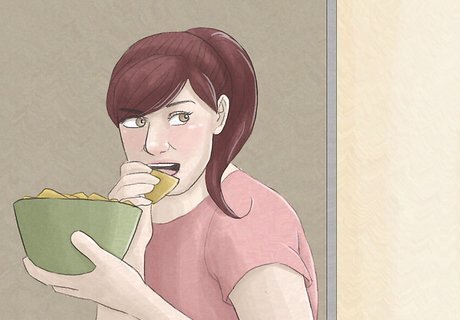
Ask yourself if you try to eat when no one is watching. If you are constantly worried about eating around other people, being judged for what you are eating, or others noticing your binges, this is a sign of a food obsession. Notice if you feel anxiety when you think about eating around others. Anxiety about either overeating or restrictive eating can affect your social life.
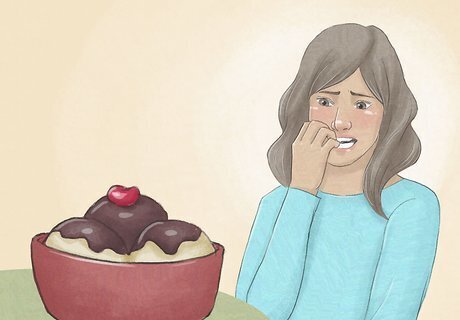
Notice any anxiety you feel when you have to break your rules. Obsessive food behaviors can include sticking with a strict schedule or a specific list of "safe" foods. If you have a specific set of rules for yourself and you get anxious when you break those rules, you may have a food obsession. You may also think of certain foods as "clean" and others as "poison," which can cause anxiety from thinking "poison" foods will make you sick. You may even feel anxious just being around those foods.
Replacing Obsessive Thoughts
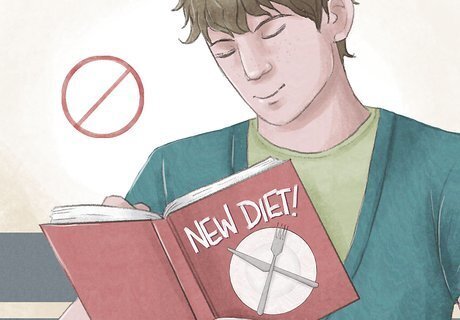
Avoid dieting completely. If you have been following a diet recently, stop. Don't look into new diets and forget the rules of any diets you used to follow. Instead, you need to focus on noticing when you are hungry, when you are full, and what foods make your body feel good. It can be really hard to suddenly stop dieting, so don't be afraid to ask for help and support.
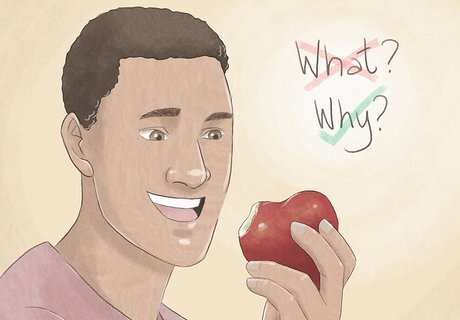
Ask yourself "why" you are eating instead of "what" you are eating. If you have a food obsession, you may also be an emotional eater. Each time you eat, ask yourself if you are eating because you are hungry, or if you are bored, stressed, or anxious. To feel good about eating, try to only eat when you are actually hungry. This will help remind you that you eat to nourish and fuel your body. Find self-care rituals to deal with boredom, stress, or anxiety.
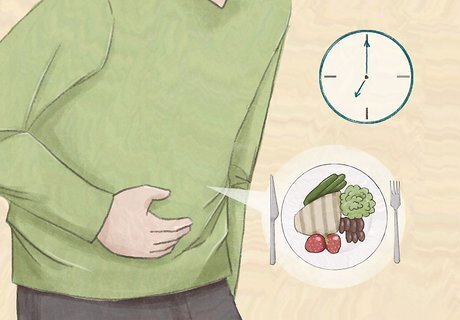
Notice when your body is hungry or full. Instead of trying to stick to a strict eating schedule, start noticing when you naturally get hungry and plan to eat then. For example, if you tend to be very hungry when you wake up in the morning, eat a hearty breakfast that will satisfy you. Some diets will tell you not to eat after 7pm, or to skip certain meals. Ignore those rules and instead, eat when you are hungry.
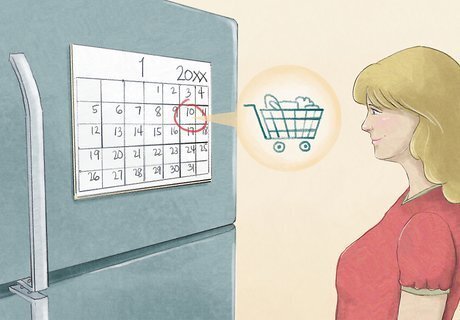
Make time to plan your eating and shopping. Obsessive thinking can creep in when you are crunched for time and need to eat quickly. Try to plan your days so that you have plenty of time to enjoy a hearty breakfast, lunch, and dinner. Give yourself plenty of time to shop so that you aren't rushing. Plan your meals around which foods make your body feel good when you eat them. For example, you might notice that dairy makes you feel sluggish or bloated. It's okay to avoid foods that make you feel bad rather than because you've labeled them as "bad." When you're rushed, emotional eating or stress eating can take over. Instead, make sure you have plenty of food available and enough time to eat so that you are satisfied. Knowing when you are naturally hungry can help you make enough time in your schedule to eat then.
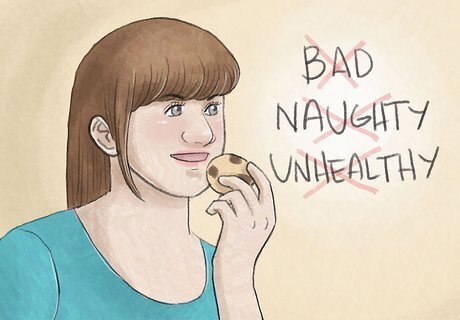
Let go of any labels you have for certain foods or food groups. If you have a list of "good," "healthy," or even "super" foods as well as a list of "bad," "naughty," or "unhealthy" foods, let those labels go. Instead, listen to what your body is craving, eat when you are hungry, and stop when you are full. You might have anxiety about eating certain foods that you have thought of as "bad" for a long time. Try eating just a little bit of one of those foods in a relaxed environment when you are starting out.
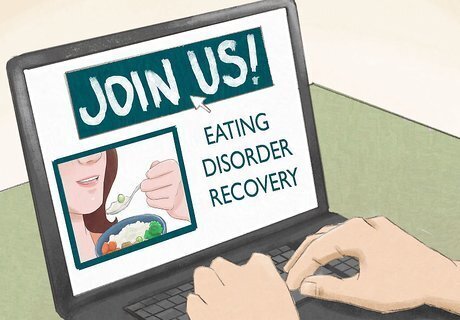
Find a supportive community. When you are trying to unlearn harmful rules about food, it's helpful to have people around you who can remind you to check in with yourself and make sure you are eating well. Let a trusted friend or two know that you are trying to let go of obsessive thoughts and ask them to hold you accountable. If you don't have a supportive community already, try looking for eating disorder recovery groups online.
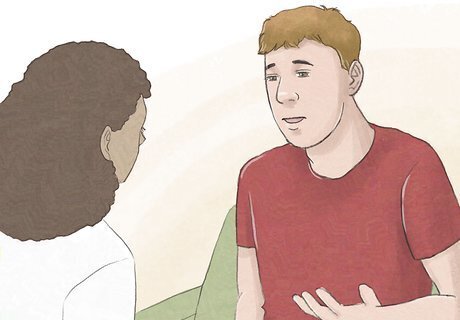
Consider getting professional help if you can't stop obsessing. There are a lot of different ways you can ask for help with a food obsession. Try seeing a counselor or nutritionist who specializes in eating disorders, anxiety, or obsessive-compulsive disorder. Sometimes food obsession is a sign of another condition, like OCD. Seeing a professional can help you identify and treat underlying conditions.




















Comments
0 comment